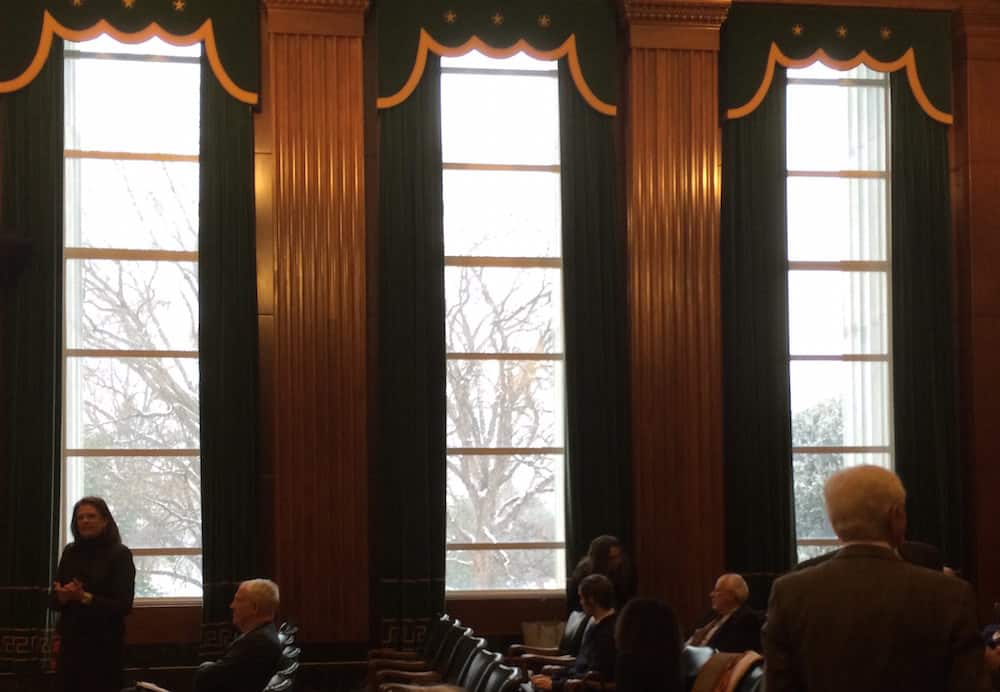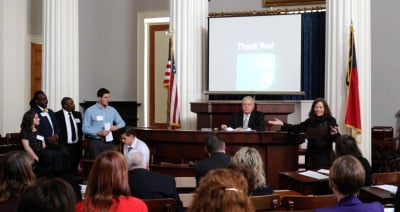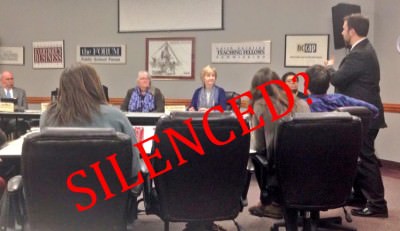
“Judge a man by his questions rather than his answers.”1
This perspective seemed especially appropriate to me while sitting in the North Carolina Supreme Court this Tuesday watching snow fall and the justices interrogate the teams of lawyers assembled to argue the constitutionality of vouchers — the Opportunity Scholarships Program. After all, we know the answers that will be offered up — they are in lengthy briefs submitted by two sets of plaintiffs challenging the program and three sets of defendants or defendant intervenors defending the program.
Over the course of two hours, justices raised a number of questions. How many? Here’s my count:
- Justice Hudson: 18
- Justice Ervin: 11
- Justice Newby: 7
- Chief Justice Martin: 5
- Justice Beasley: 1
- Justice Edmunds: 0
- Justice Jackson: 0
Of course this isn’t baseball and question statistics don’t matter too much. It is the substance of the questions. “There are no right answers to wrong questions.” (Ursula K. Le Guin) Or as said by Bono, “We thought that we had the answers, it was the questions we had wrong.” And, “asking the right questions takes as much skill as giving the right answers.” (Robert Half)
In this case, the questions are about the constitutionality of the Opportunity Scholarship Program which allows parents to choose to send their child to a private school at taxpayer expense of up to $4200 per year. This program raises fundamental issues of the state’s constitutional responsibilities for education, the extent to which the constitution imposes limitations on the General Assembly, and the tension between accountability and flexibility to provide different types of schooling opportunities. Asking the right questions will be crucial to arriving at the right result.
Here are some of the questions asked by the justices.
In regard to the public purpose requirements of the constitution for expenditure of taxpayer funds:
“Among undisputed facts, private schools are not required to be accredited by the State Board or any other state or national institution; not required to employee teachers or principals who are licensed; not subject to any requirements regarding the curriculum; not required to provide a minimum amount of instructional time; not prohibited from discriminating against applicants on the basis of religion. Should there be statutes? How does accountability to a parent turn it into public purpose?”
– Justice Hudson
“What about apparent evidence that less advantaged children attending private schools have a greater likelihood that they will go on to college? Why is this not one way to assess public purpose?”
– Justice Newby
“Is it your contention – no standards at all are required for public purpose or alternatively that the standards set forth are sufficient?”
– Justice Ervin
In regard to Article IX, Section 6 on funding for education:
“Why is it that/how is it that this provision can bind a future General Assembly? Who determines ‘so much of revenue?'”
– Justice Newby
“What degree of experimentation does the General Assembly retain when faced with problems: is there a categorical bar to non-public options?”
– Chief Justice Martin
We will find out how the court answers these questions in the following months when it issues its opinion. This case challenges our understanding of the full scheme of primary and secondary education in North Carolina. And so one more quote: “In all affairs, it’s a healthy thing now and then to hang a question mark on the things you have long taken for granted.” ( Bertrand Russell)
While the court gets the final say on the constitutionality, the issue of how to best serve all students is also a question for all of us. And to start this conversation, I will share the observation of Alice Hart, lead plaintiff in Hart v. State, and a former teacher, administrator, and current grandmother and volunteer.
Ruby Payne’s book, A Framework for Understanding Poverty, should be required reading for legislators who think a voucher will solve the problems. I am working with a child who has been in five foster homes in the last years. She can learn but has to repeatedly start over with new families, new schools. I think of her every day. There are many like her. The problems are complex and can’t be solved without accountability at every level and a desire to address the root problems that leave so many of our children wanting.
Your questions? Your answers?
Recommended reading



